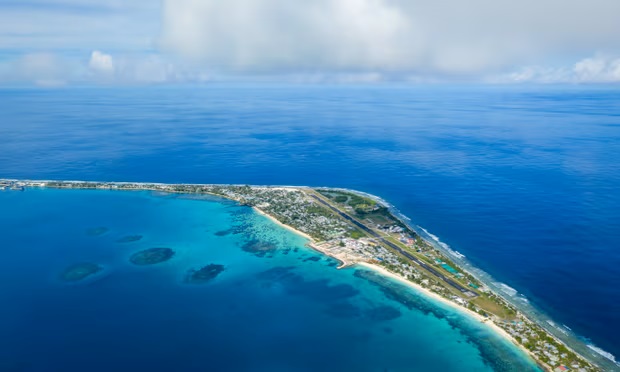Tuvalu, an island nation threatened by sea-level rise in the South Pacific, is preparing for the worst-case scenario of submersion by digitising its government and taking other steps to secure its future, Prime Minister Feleti Teo said in a recent interview.
Made up of nine low-lying coral atolls with an average height above sea level of just 2 metres, Tuvalu’s 26 square kilometers of land could be beneath the tide within decades due to climate change.
Speaking to Kyodo News on Tuesday, Teo said the long-term digitisation project envisions moving government services and records to an online platform, while also preserving the cultural memory of Tuvalu “in a way that it can be treasured for many years into the future, regardless of the status of our land.”
Faced with the stark reality of global warming, Tuvalu is working to guarantee its statehood in perpetuity under international law while continuing to fortify its coastline and reclaim land to provide resilience against sea level rise, Teo said, speaking in a government building that sits on reclaimed land in Funafuti, the biggest island.
His government is pushing for changes to international law to guarantee Tuvalu’s continued statehood, regardless of the impact of sea level rise on its physical territory, and the permanence of its maritime borders.
“Ultimately, my hope is that those efforts will result in a UN treaty on sea level rise,” the prime minister said, adding that he hopes Japan will support Tuvalu’s push to institutionalize those principles in international law.
As for the prospect of mass migration out of Tuvalu due to climate change, he sees it as unlikely, stressing that most Tuvaluans desire to stay in Tuvalu.
Under a landmark climate and security agreement signed with Australia in 2023 dubbed the Falepili Union, up to 280 Tuvaluan citizens will be able to migrate to Australia each year.
With an estimated population of just 9,600 people, Tuvalu could be depopulated in 35 years at that rate. However, Teo stresses there is no compulsion for people to join the scheme, and those who take up the opportunity can return to Tuvalu anytime.
Tuvalu has seen a 15-centimeter rise in sea level over the past 30 years, at a rate 1.5 times the global average, according to the Sea Level Change Team of the U.S National Aeronautics and Space Administration(NASA).
By 2050, NASA scientists project that much of the nation’s land and critical infrastructure will be below the average high tide.













